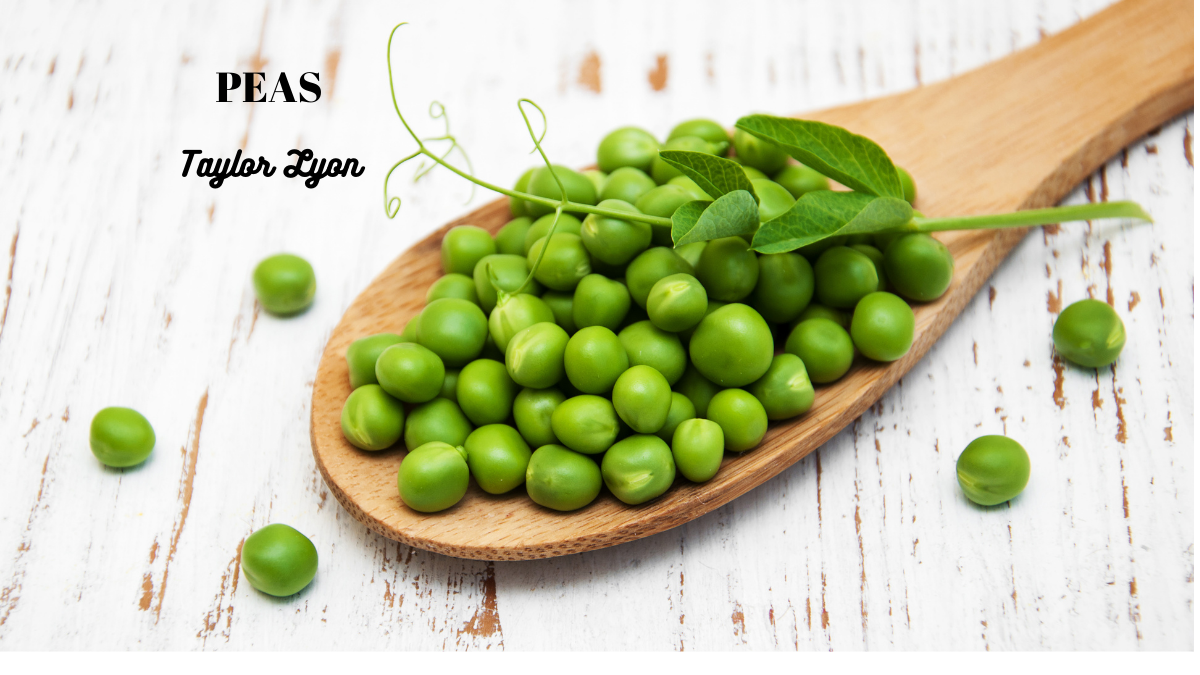Your cart is currently empty!
“Peas”
”It’s a little past noon and church let out half an hour ago, the second service. The eight o’clock service is a little too early for fire and brimstone or the exaggerations of Revelations. That’s what Dad says, even though he didn’t come for the late service either. He hasn’t come with me and Mom for weeks, but he meets us afterward for lunch. My clothes still smell musty like the church pews when we get to my grandparents’ house.
I sit in between Mom and Dad at the table made from a dogwood tree. The table sits by the front door, flanked by cabinets of silverware and plates, crowded with aunts and uncles. Potholders line the table and are filled by a medley of casserole dishes, skillets, and crockpots. Smells of roasted meat and bacon grease and melted butter waft into the air. Steam rises from the mashed potatoes and brushes against my face. The last of the crockpots clinks against the table, and our family takes a seat, chairs creaking. My grandfather bows his head and takes my grandmother’s hand. As he does every Sunday he closes his eyes and says the prayer.
“God, we receive your blessings and thank you for them. We thank you for this food, our family, and the love and open hearts between us. Amen.”
A collective amen ripples and vibrates across the table, and I watch our family before the prayer ends. “You’re supposed to close your eyes while praying,” Mom often tells me, but I prefer to keep them open and see what I can find. So I gaze across the table until I meet open eyes. Uncle Neil is across from me, a slight, freckled man with a deep crease between his brows. He stares straight ahead, and the blue of his irises focuses on me. He smiles at me and looks away. For some reason he is my favorite uncle, trumping his brothers the preacher and the police officer. One day I will understand why. Why he left the family, why he left this house of locked cabinets and closed windows. One day we’ll have much to talk about, but today is not the day for conversations.
At my side I notice that Dad’s eyes are open too. His hair is rigid and slicked back with gel, his mouth a thin line sewn shut. His hands are clasped in his lap. He has the same sharp blue eyes as his brother, yet he doesn’t look back at me. Just before the prayer ends, he closes his eyes and then opens them as the rest of our family looks up.
Mom holds my hand and looks at me, her smile an arc across her face. She reaches for a ladle in a silver bowl and plops a dollop of mashed potatoes onto my plate. Then she spoons out some peas next to the potatoes and does the same for Dad. I find it strange that he always mixes his peas into the mashed potatoes. They are better this way, he insists as he twirls his fork around his plate. Some things are better hidden.
Our family hovers around the table, and a tangle of arms stretches for the casserole dishes and serving bowls. After every plate is filled, the orchestra of clinking metal and rattling ceramic begins. We all stab at our plates and ladle grease-soaked vegetables into our mouths. Chewing and swallowing are our conversations. My grandfather slurps his tea and adjusts his window-thick glasses. He glances over at Uncle Neil, salad hanging from the side of his mouth.
“Everything all right, son?” he says, setting down his glass.
“Fine. Just tired is all.”
“You look like you’re coming down with a bug.”
“Just a lot of night shifts in the ER this past week. That’s all.”
Uncle Neil smiles at him and then at his wife, who sits beside him wearing a sunken face. My grandfather nods his head and accepts this lie without second thought. He does not know that his son doesn’t work night shifts, does not know that his son is hiding a part of himself. One day he will ostracize his own son, but he doesn’t fathom this yet.
Second servings are doled out, conversations are not. Our family passes around the roast beef and overcooked green beans. My uncle the preacher fills the silence and rambles on about a new church member who approached him after the sermon this morning. He shoves a bundle of green beans into his mouth and describes the encounter. The man had tight lips and a limp as he stumbled up to the pulpit. This penitent, my uncle calls him, wanted to know His stance on adultery and things of that matter, he tells the table. My uncle pauses to fit a bread roll into his mouth and swallows it in a few gulps. As he talks he flings his arms above the table like a guard goading on prisoners.
“It’s clear as a bell in Exodus,” he says, “The Lord writes in the commandments that thou shall not commit it.”
My uncle babbles on about the penitent asking about exceptions to the commandment while he serves himself a slice of coconut pie. No loopholes, no special cases, nothing, he explains. Sure, He forgives, of course He forgives. One must be willing to be forgiven though, one must ask for it and repent for it. My uncle separates his mashed potatoes from his peas as if parting the red sea itself. He sets down his fork and bellows to no one in particular that He forgives all. That if one asks, one shall be forgiven. That if one doesn’t ask, well, one shall perish, as says the Gospel of Luke.
A chair squeaks and Dad rises and excuses himself to the bathroom. Mom’s hand tightens around mine, and she gazes down at her plate, stirring together her food. Dark pouches hang under her eyes, wrinkles curve around her mouth. She knows that she will have to leave this table one day, one day very soon. Once before she tried to stay, holding onto counterfeit promises and vacant apologies, but she will not be able to forgive Dad for his sin twice committed. This sin will live in the shadow of our lives for many years, the specter that hides in dusty photo albums and family portraits long abandoned.
Across the table Uncle Neil fiddles with his fork and whips together the mashed potatoes and peas on his plate. The peas hide beneath the cream-colored swirls. He and his wife do not look at each other nor talk to each other. They clink their silverware together to communicate. My uncle the preacher has run out of Bible verses and is busy sampling the remnants of his lunch. Down the hall the faucet runs then stops, and a door screeches open. Dad returns to the table, squeezing past me and to his chair. He sits down and stares at his plate and rubs his face.
“Haven’t seen you at church in some time, son,” my grandfather says to Dad.
“I’ve been working Saturday nights, security.”
“He gets home late,” says Mom.
My grandfather accepts this lie and smiles. He comments that Dad works hard, like himself, that he must have received that quality from him. On the opposite side of the table my grandmother rolls her eyes at this remark and shakes her head. She knows there is something hidden within Mom’s words, but she says nothing and swallows a spoonful of potatoes.
Mom stares at her plate and continues stirring her food together. Dad does the same, keeping his eyes down, his mouth sealed. The casserole dishes are empty, silverware is put down, silence spreads across the table. There is nothing left to fill the gap, the gap across the table that is too wide to be closed. I watch my family stare at their plates and hide their peas. I do not know that I will learn how to hide them very well, that I will hide them for so long that I will forget their taste. I will forget the taste of what is unhidden.
Taylor Lyon is a speculative fiction writer located in California. He works in content strategy, having recently transitioned from teaching English. In his free time, you can find him sculpting animals in small hats.


Comment